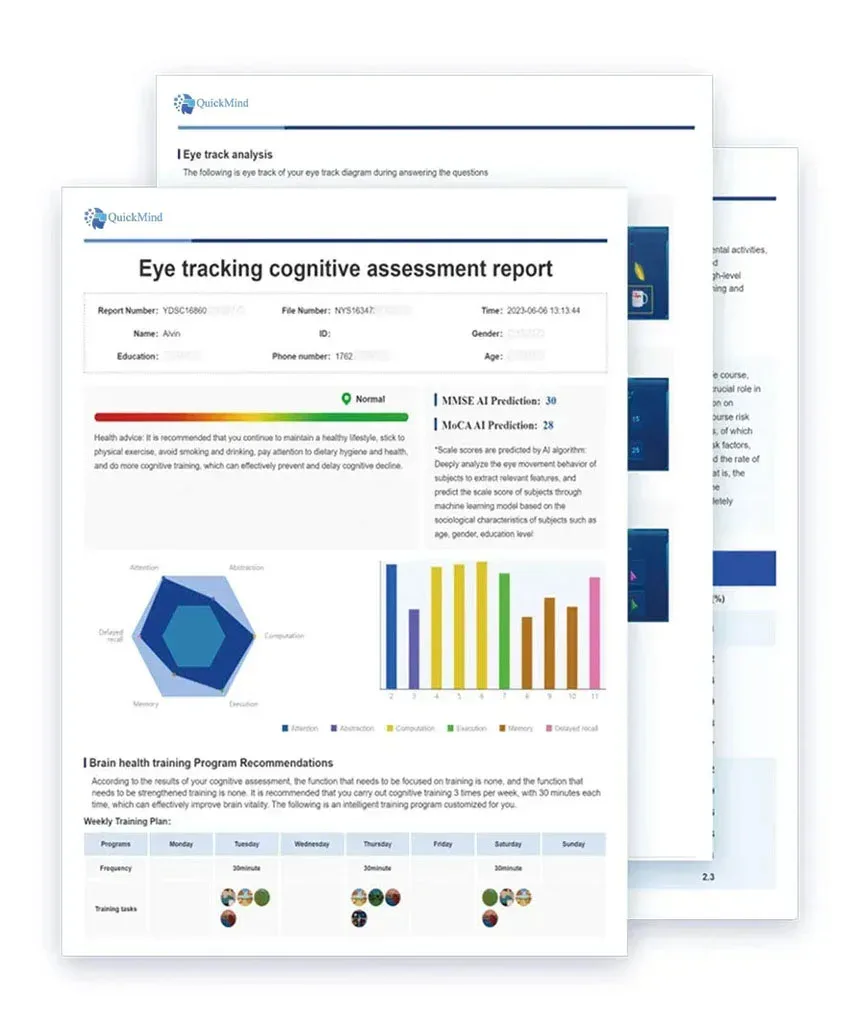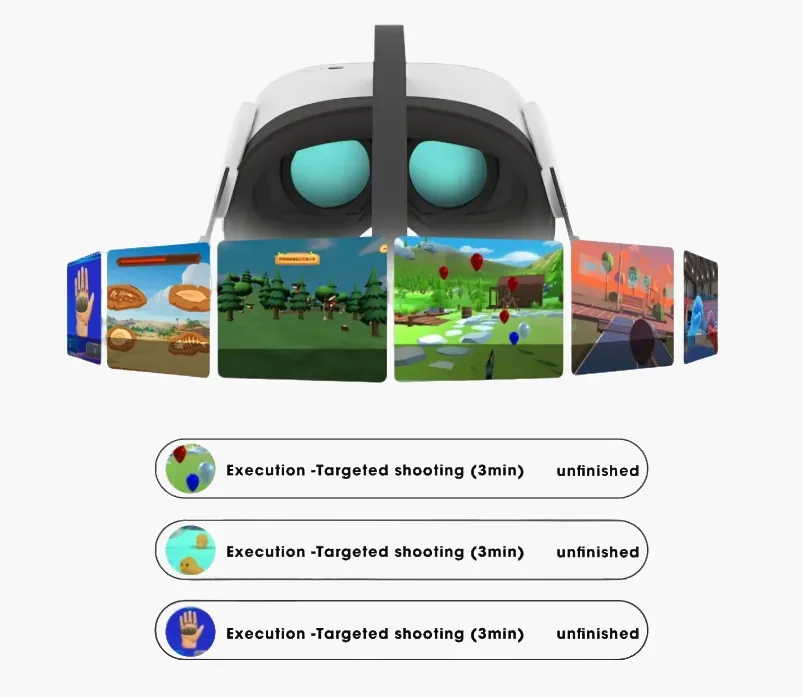sophisticated brain assessment platforms progressive digital tools supporting cognitive recovery?

Progressive explorations suggests that computer-generated reality therapy can markedly elevate the health of users coping with dementia. By transporting them to soothing environments, VR offers a unique platform for cognitive stimulation, affective stabilization, and socialization. Various research works have shown that VR therapy can minimize excitability, stress, and depression in dementia persons affected while also elevating their remembrance, attention, and linguistic talents.
- VR grants people with dementia to retrace fond remembrances through engaging simulations.
- What's more, it can furnish a safe and facilitative space for social contact, developing a notion of relationship and acceptance.
- Investigators consider that VR therapy has the capacity to remodel dementia management by offering new and cutting-edge approaches to address the intricate challenges faced by clients affected by this state.
Electronic Health Solutions for Mental Boosting in Alzheimer's
Expanding software-based interventions are demonstrating potential in the domain of mental improvement for users affected by cognitive Alzheimer's illness. These tools exploit automated tools to stimulate brain capacity and hypothetically mitigate the spread of the syndrome. Playful routines, personalized mentoring, and neurological training are some instances of tactics being tested in this expanding sphere. While examinations are proceeding, digital therapeutics offer a alternative pathway for improving the conditions of those affected by Alzheimer's ailment.Exploring Virtual Worlds: Innovative Methods for Alzheimer's Care
In relation to persons dealing with Alzheimer's dementia, the progressive degradation of memory and thinking skills can markedly hamper their skill to engage with the surrounding environment. This weakening disorder often produces in withdrawal, frustration, and a impaired self-perception. Latest advancements in virtual reality technology bring a trailblazing pathway to counteract these concerns by generating immersive worlds that can encourage the brain and rekindle cognitive function.
Artificial reality spaces tailored specifically for those with Alzheimer's can send them in known settings, such as their old family house or a well-liked park area, stirring positive memories and decreasing anxiety. Through interactive practices, these virtual worlds can also develop cognitive abilities like memory, concentration, and decision-making.
The prospects of virtual reality in Alzheimer's treatment are considerable. Early research have confirmed encouraging results, with cases experiencing improvements in cognitive ability, mood, and overall quality of life. As this technology proceeds, it holds the key to modifying the way we approach Alzheimer's disease, granting a new pathway for help and encouragement.
Computer-Aided Reminiscence for Alzheimer's Victims
Reminiscence therapy is an established technique used to augment cognitive function and emotional stability in individuals with Alzheimer's disease. This classic form of therapy involves stimulating patients to recall past experiences, often through dialogue. However, a pioneering approach is emerging: VR-mediated reminiscence therapy.
This immersive solution utilizes virtual reality headsets to place patients in lifelike environments that recall memories from their past. By reliving these artificial surroundings, individuals with Alzheimer's can associate with their past in a influential way.
Innovative VR Techniques to Aid Memory and Cognition in Dementia
Virtual reality (VR) is emerging as a novel instrument in the fight against dementia, supplying trailblazing ways to invigorate memory and cognition. By designing immersive worlds, VR can guide individuals with dementia recover memories, involve in meaningful activities, and elevate cognitive capacities. Studies have revealed that VR interventions can lead to noticeable improvements in memory recall, attention, and locational awareness. Moreover, VR provides a comfortable and favorable space for individuals with dementia to demonstrate, reducing feelings of isolation and anxiety.
- Also, VR can be configured to individual needs and preferences, enabling broader levels of involvement.
- Even with the potentials of VR, ongoing research is needed to fully understand its long-term success in dementia care.
Renewing Memories, Enhancing Relationships: VR for Alzheimer's Social Health
Artificial augmented spaces is emerging as a advanced tool in the domain of cognitive disorders. By generating absorbing and communicative realities, VR has the prospect to reignite memories, develop social interaction, and improve the overall quality of life for persons experiencing Alzheimer's. One of the most promising aspects of VR is its ability to shift users to recognizable settings and moments from their past. Whether it's a ramble through a childhood home or a illustration of a beloved holiday, these virtual escapades can summon happy memories and deepen cognitive function. Furthermore, VR can aid social interaction by coupling Cognitive Rehabilitation individuals with others who share similar memories. This can be particularly constructive for people with Alzheimer's who may struggle with traditional social interaction. By offering a safe and interactive virtual space, VR can ease feelings of isolation and loneliness, which are common among persons experiencing Alzheimer's. Overall, VR holds immense promise for reshaping the lives of users with Alzheimer's by revitalizing memories, rebuilding connections, and enhancing their quality of life. As technology continues to evolve, we can expect even more imaginative applications of VR in the field of dementia care.Incorporating Cognitive Training: Implementing VR Techniques for Alzheimer's Aid
Immersive reality systems is rapidly emerging as a cutting-edge tool in the realm of cognitive training, particularly for persons affected by Alzheimer's disease. By immersing patients in interactive and engaging virtual environments, VR-based interventions can improve cognitive functions such as memory, attention, and problem-solving. These games regularly incorporate elements of storytelling, exploration, and social interaction, making the training process very motivating. Studies have shown that VR-based cognitive training can lead to marked improvements in cognitive performance, theoretically delaying the progression of Alzheimer's symptoms. Moreover, VR provides a safe and controlled environment for patients to practice new skills and enhance their confidence.
- Interactive gaming in VR training can make it deeply absorbing and pleasant for participants with neurological deficits.
- VR simulations can offer authentic scenarios that promote and boost cognitive functions.
- Personalized VR experiences can cater to particular desires and modalities.
Harnessing Virtual Settings for Dementia Relief
Immersive synthetic surroundings offer a innovative and encouraging avenue for participants with mental deterioration. These platforms can generate familiar environments, allowing those affected by cognitive decline to access cherished memories and promote a sense of familiarity. By countering the burdens of dementia, VR environments have the potential to boost quality of life for both participants and their aides.
- Assessments indicate that VR strategies can meaningfully impact cognitive function, emotional well-being, and even motor abilities in individuals with dementia.
- Moreover, VR enables a safe and organized environment for exploration, reducing the risk of stress.
- Beyond this, VR can promote social connections by allowing individuals with dementia to collaborate in artificial activities with others.
Game-Changing VR Solutions for Early Alzheimer's Assessment
cognitive Alzheimer's illness represents a complicated puzzle, often going undetected in its early stages. Though, virtual reality (VR) is gaining traction as a cutting-edge tool for identifying the disease at an early stage. Through immersive platforms, VR can analyze cognitive abilities in ways that traditional methods are inadequate to. This promise allows for early treatment strategies, potentially retarding disease progression and increasing the quality of life for users with Alzheimer's.
- VR cognitive tests measure recall, alertness, and positional skills in safe and regulated spaces.
- Bespoke VR applications facilitate interactive mental activity for patients.
- VR worlds offer empathetic environments for interaction among those affected by Alzheimer's.
VR as a Medium for Dementia Engagement and Social Participation
{In the realm of dementia care, innovative technologies are emerging to strengthen the lives of individuals living with this challenging condition. Virtual reality (VR) is one such mechanism that holds immense prospect for enhancing social engagement and communication in dementia care. By providing enthralling virtual settings, VR can activate cognitive function, reduce behavioral issues, and ultimately improve the overall well-being of individuals with dementia.
VR experiences focused on dementia patient engagement can range from reflection therapy sessions that bring individuals into past familiar contexts, to interactive games that promote social interaction and cognitive exercise. Furthermore, VR has the skill to connect people with dementia to support circles, regardless of physical isolation, fostering a sense of community.
- VR can facilitate in reducing agitation and anxiety by providing a calming and focusing environment.
- Clinical trials have shown that VR interventions can lead to improvements in cognitive function, mood, and social interaction in participants with dementia.
- As technology progresses to advance, we can expect even more innovative and powerful
